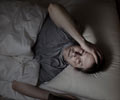Study questions the effectiveness of neurofeedback training on patients suffering from insomnia.

- Despite the heavy disease burden of insomnia, very few non-pharmacological studies have addressed it.
- Neurofeedback training that builds on behavioral conditioning is generally thought to benefit insomniacs.
- But new study states that neurofeedback does not have a specific efficacy for the treatment of insomnia.
The researchers wanted to test whether the desired positive effect of neurofeedback on sleep quality and memory could also be replicated in a double-blind placebo-controlled study.
Study
For the study, researchers recruited thirty patients with primary insomnia, who underwent neurofeedback treatment and placebo-feedback treatment over several weeks.
The neurofeedback effects were tracked using measures EEG, sleep and quality of life in insomnia patients.
Patients spent nine nights and twelve sessions of neurofeedback treatment and twelve sessions of placebo-feedback training (sham) with real EEG feedback, yet on varying frequency bands.
Researchers used eight sleep laboratory nights, as well as sleep diaries and actigraphy over the course of the whole protocol, to assess the sleep-wake cycle of the participants.
Results
Researchers found that sleep was improved in both neurofeedback and placebo groups suggesting that the observed improvements were due to unspecific factors such as experiencing trust and receiving care and empathy from experimenters.
The results show that patients benefitted from any treatment on some subjective measures of sleep and life quality. But objectively, these improvements were not reflected in EEG-derived measures of sleep quality or oscillatory brain activity.
Neurofeedback does not have a specific efficacy beyond unspecific placebo effects, for the treatment of insomnia. They did not find an advantage of neurofeedback over placebo-feedback.
"Given our results," said lead author Manuel Schabus, "one has to question how much of published neurofeeback effects are due to simple expectations on the side of the participants or, in other words, unspecific placebo effects".
Unspecific factors such as affection and care caused the improvement of symptoms.
Although neurofeedback can be promoted as an alternative to established therapeutic approaches, this study questions the usefulness of neurofeedback on a more general level.
The new study is published in Brain.
Reference
- Manuel Schabus et al. Better than sham? A double-blind placebocontrolled neurofeedback study in primary insomnia. Brain ; (2017) doi:10.1093/brain/awx011
Source-Medindia















